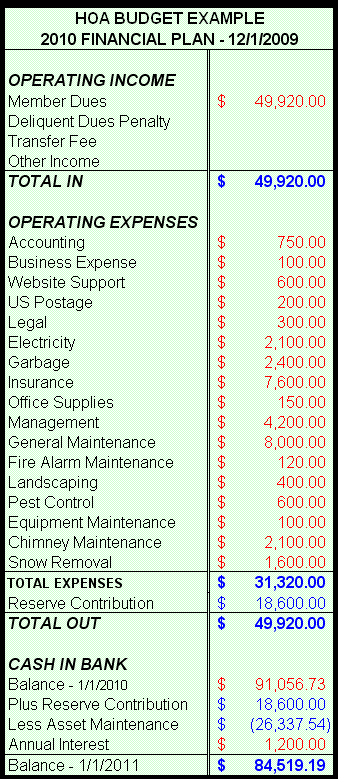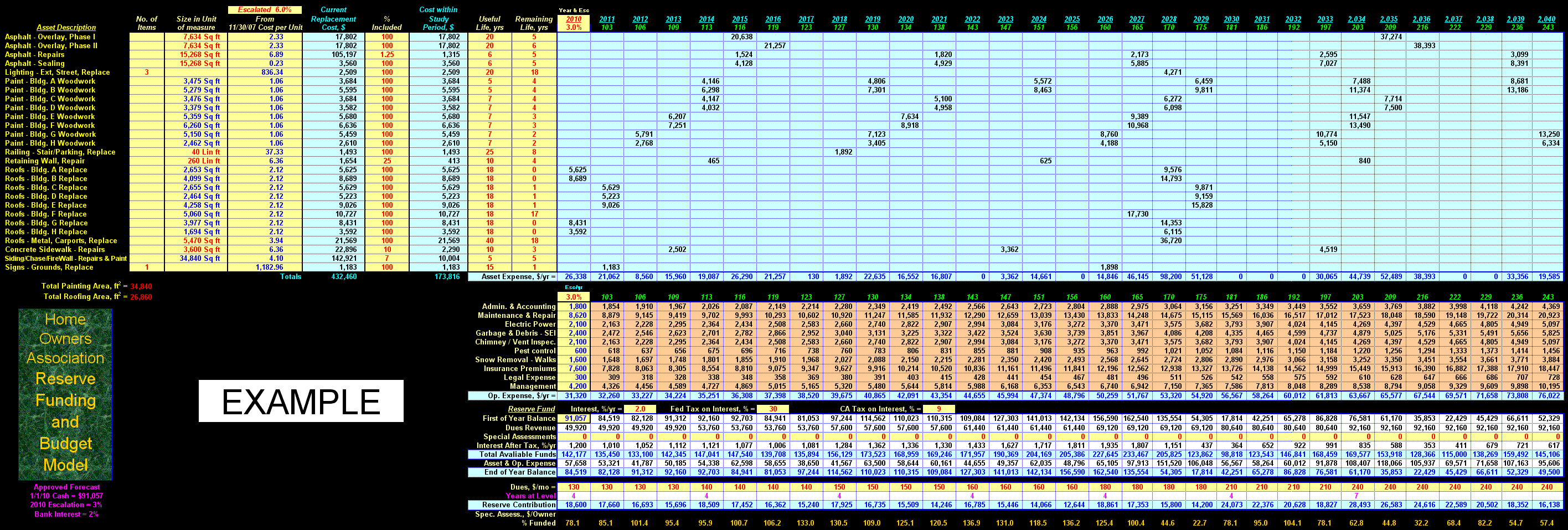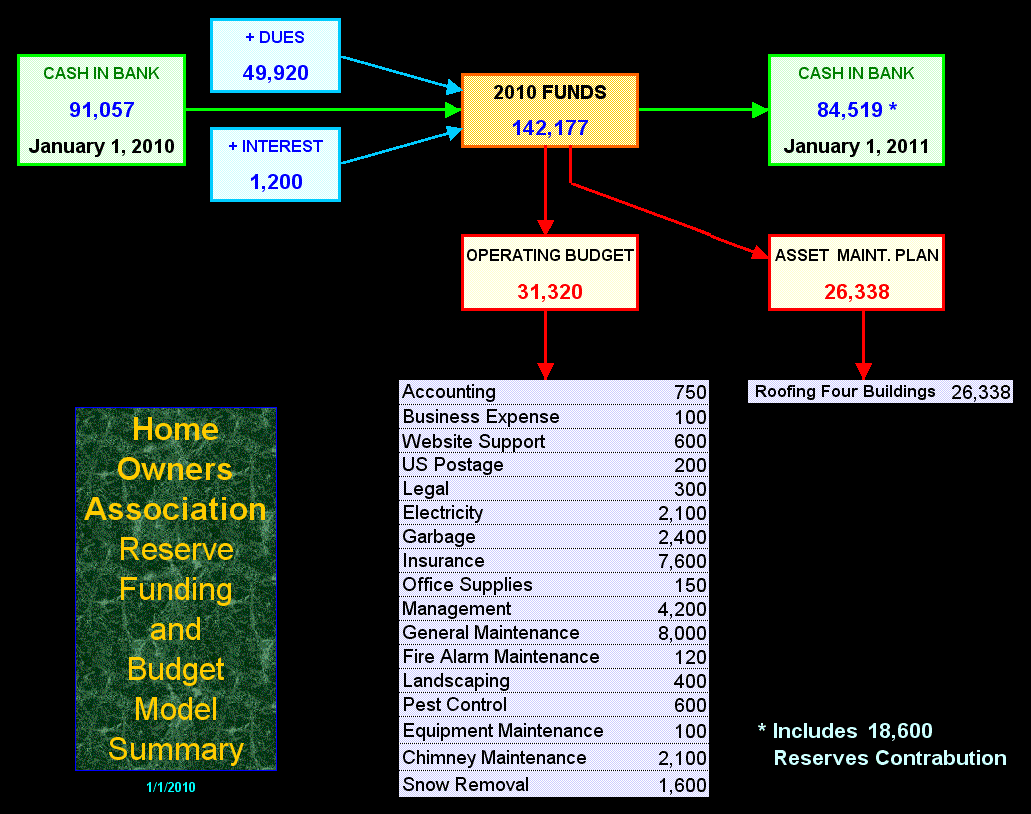|
HOA Cost Management |
||
|
Seeking Veracity |
greytrek.com | |
 Those Home Owners
Associations that have common areas and facilities have two
types of financial management to deal with. The first is annual
operating expense. For example, utilities, management fees,
insurance, and supplies would be in this first category. But
the second is replacement of depreciating common assets. These
consist of things like private roads, buildings, recreational
facilities, and fences, etc. Those Home Owners
Associations that have common areas and facilities have two
types of financial management to deal with. The first is annual
operating expense. For example, utilities, management fees,
insurance, and supplies would be in this first category. But
the second is replacement of depreciating common assets. These
consist of things like private roads, buildings, recreational
facilities, and fences, etc.
The Budget is pretty straight forward. An HOA Board would develop a "zero based" budget each year which is just a compilation of expected operating expenses and bills. However the forecast of required revenue for Replacement or Major Repair of Common Facilities is more difficult. Diligent completion of these two studies permits the HOA Board to establish the required Regular Assessments (Dues) for the membership. There are many companies that analyze HOA common facilities and prepare a "Reserve Study" for a fee. These can be expensive and somewhat confusing. HOA Boards are lead to believe that they must pay for a service by a company that specializes in providing reserve studies for community associations. For a Board to prepare this analysis themselves, "due diligence" is certainly required. But, a specialized company to do this is not necessary. The purpose of this part of my website is to give "screen shot" examples my system. An HOA Board can construct this sensible financial management system, avoid hiring a specialized company for a Reserve Study, and keep the HOA members completely informed. It employs a clear, straight forward budget, linked to an easy-to-understand "Reserve Funding and Budget Model". Here is an Example of a Simple Budget. In this case the home owners association consisting of 32 town houses. The regular assessments (monthly dues) are $130. These are association Operating Expenses that include a Reserve Contribution (leftover cash). It also includes the association Cash Position (all liquid assets). This considers the starting balance, the Reserve Contribution, Asset Maintenance planned for the coming year, in this case 2010. The philosophy is totally about current cash available and forecasted cash flow, in this case for the next 30 years. Financial concepts are kept as simple and sensible as possible. |
| Forecasting the maintenance
needed for the association's assets that eventually must be repaired or
replaced, conceptually is pretty simple. Look at the example
below. Let's consider the need to paint the woodwork for
building C and follow it through. First we need the to measure or
specify the surface area to be painted, "Size in Unit of
measure". Note that if size is not a factor, "No.
of Items" is. But in our case, 3,476 sq ft
(blue) has been calculated from another spreadsheet and transferred
here. It could have been entered directly (red).
The next column, "From 11/30/07 Cost per Unit"
figure, $1.06/sq ft, has been escalated by 6.0%/yr to update the
current unit price of an older quotation. Then, the "Current
Replacement Cost", $3,684, is calculated in the next
column. If we're considering that the whole defined area needs
painting each time we do it, the "% Included"
will be 100%. If only a fraction of the area needed repainting,
then a lower percentage would be inserted. In this case, the
"Cost within Study Period" is the same at
$3,684.
Now, the "Useful Life" must be projected into the future. This can be obtained by paint manufacturers or painting contractors. For all other elements in the scope, a useful life estimate must be obtained. In this case we have estimated 7 years. Depending on when the building was painted, it's easy to estimate the "Remaining Life" and for this year, 2010, it is 4 years. The year of 2013, will be the last year of the paint's life and must be repainted in 2014. The spreadsheet formulas handle this for all scope elements automatically, so there is no tedious computations to be made. All you have to do is to adjust the inputs and the spreadsheet handles it in split seconds. So it very easy for Board of Director members to experiment with that forecast until a realistic annual cost of asset maintenance can be predicted. Of course this is only an estimate. Each year prior to the development of the Association Budget, this forecast should be updated. This is much more convenient that receiving an "hard copy report" from a professional organization for which, 1) you have a lot of newly defined terms to understand, and 2) you have to depend on contacting the company for adjustments, usually at a price. This way, you have the model at your finger tips for easy revisions, updates and corrections.. In concert with, or as a member of the Board, you can come up with a reasonable financial plan that is explainable to the membership. And that's very important!! So you are in control. |
 |
| Now that we have completed the two very important financial studies for an Home Owners Association, we have to combine the results in order to determine what the association membership will need to pay as Regular Assessments . . . or Monthly Dues. Remember in this Example, there are 32 members in this Association. The Monthly Dues can be input for each year by trial and error until the balance of Cash in the Bank for each year is positive. You can even decide on a minimum acceptable balance in the bank and base your monthly dues projections on that. Note that both the Asset Expense and Operating Expense forecasts can be adjusted for Escalation and for Taxes on Interest income if you are a "528 corporation". It usually turns out that by accounting for all of the factors, generating a complete scope, and diligently estimating cost, your forecast of cost and needed revenue will be quite reliable. But you must Update the Input Information Diligently Each Year. |
| Here is a graphic Summary of the Cash Flow. It enables one to quickly grasp the associations' cash position and how funds are to be distributed for the coming year. You are now in a position to Manage your HOA Cost. |
 |